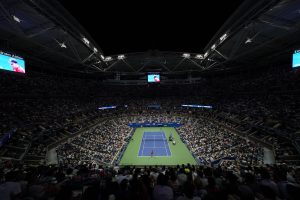The 2021 Australian Open Men’s Singles event has produced more epics than an old-time Hollywood studio. In at least four classic five-set encounters, the best male tennis players in the world – including Novak Djokovic, Rafael Nadal, Stefanos Tsitsipas, Dominic Thiem and Nick Kyrgios (who may not be ranked as highly as the others but is surely their equal in ability) – have thrilled not only the world of tennis but the sporting world in general. For a tennis fan, it has been extremely satisfying and gratifying to hear and read the admiration from fans of other sports, many of whom often deride tennis, not least because it is played with a soft ball and without any actual bodily contact between the players. Put simply, even the most ardent non-tennis fan must have been thrilled by what has been happening in Melbourne.
As with so many things at the Australian Open in 2021, Nick Kyrgios got the ball rolling – or perhaps “the boulder rolling” would be a more accurate term, given the scale, intensity and duration of the two five-set matches that he contested. First of all, in the second round against France’s gifted youngster Ugo Humbert, he came back from two sets to one down to win in five, 5-7 6-4 3-6 7-6 (7-2) 6-4, in nearly four hours. Unfortunately for Kyrgios, the great maverick of men’s tennis was then on the receiving end of a spectacular comeback, as Dominic Thiem, the reigning US Open Champion, came back from two sets down to win 4-6 4-6 6-3 6-4 6-4 in the third round.
On the same day that Kyrgios contested his second five-setter in succession, Novak Djokovic, the holder of the Australian Open title and eight-time winner of the event, almost blew a two-set lead against the USA’s Taylor Fritz, the big server who must have thought that his Major breakthrough had finally arrived when he took the great Serb to a fifth set. However, overcoming both his opponent and his own apparent injury problems (which, typically for Djokovic, have healed remarkably quickly during the tournament), Djokovic eventually won 7-6 (7-1) 6-4 3-6 4-6 6-2.
However, the best (at least until now) was saved to last, with the truly classic quarter-final match between Rafael Nadal and Stefanos Tsitsipas, when the Greek looked set for certain defeat after losing the first two sets before literally roaring back to win in five, 3-6 2-6 7-6 (7-4) 6-4 7-5. It was only the third time ever in nearly 20 years as a professional that Nadal had lost a two-set lead, and only the second time at the Majors, after Fabio Fognini beat him at the US Open in 2015. However, Tsitsipas proved again that such records are there to be broken as he finally defeated Nadal in a breathtakingly beautiful and brutal match that lasted for over four hours.
Perhaps, just perhaps, the best has not yet come, because the Men’s Final between Novak Djokovic and Daniil Medvedev also has the potential, like Nadal-Tsitispas, to be not just unforgettable but potentially era-defining, or even possibly era-ending. Like Nadal-Tsitsipas, it is another clash of age versus youth and all-time great versus great-right-now. Given that Djokovic will be going for a truly remarkable ninth title in Melbourne, which would take him to 18 Majors in total, and Medvedev (who has already played a five-setter himself, against Filip Krajinovic in the last 16) is currently the World No.1 on form, having not lost to anyone since the autumn, there is every chance that the Final will go to five sets. And if it does, given the apparently unbreakable will of both men, it could truly be a Final for the ages.
Of course, none of these masterpieces or near-masterpieces would ever have happened if the likes of Billie Jean King had got their way and male tennis players were now playing three-set matches at Majors rather than five-set matches. A few years ago, of course, King famously said that she thought that the Djokovic-Nadal Australian Open Final of 2012, which lasted for nearly six hours before Djokovic finally won in five sets 5–7, 6–4, 6–2, 6–7 (5–7), 7–5, had shortened the careers of both players by at least a year. However, nearly a decade on from that remarkable match, which was undoubtedly the greatest Australian Open Final ever and a contender for the title of the Greatest Major Final anywhere, both Djokovic and Nadal remain No.1 and No.2 in the world. If anything, the phenomenal, generational rivalry between them both, and of course also with Roger Federer, may just have prompted them to prolong their careers for longer than they might otherwise have done.
The many epic men’s matches at Melbourne this year, particularly the Nadal-Tsitsipas quarter-final, should surely end any calls, from Billie Jean King or anyone else, for the men to switch to playing three-set matches rather than five-set matches at the Majors. If such a change ever happened, it would represent a terrible breach in the history of tennis, whereby all the Major men’s champions over the last 150 years can be directly compared with each other because they all played five-set matches at the Majors. Even more importantly, it would prevent any possible repetition of truly great matches such as Djokovic-Nadal in 2012 or Nadal-Tsitsipas in 2021.
In fact, rather than calling for the men to stop playing five-setters at the Majors (and it is worth remembering that now it is only at the Majors that men play five-setters, after both the Masters events and the Davis Cup switched to the three-set format in recent years), Billie Jean King and others should be calling for women tennis players to play five-set matches, too. It is ironic that BJK, the greatest off-court champion that tennis has ever had (among both men and women) and even beyond tennis a champion of gender equality, should be calling for a levelling-down, whereby the men play three-set matches, rather than a levelling-up, whereby the women would also play five-set matches, perhaps beginning with the second week of a Slam but eventually extending to cover all rounds of a Major tournament.
The fact is that nothing in tennis is as exciting as a five-set classic and arguably nothing in all of sport. The nature of the scoring system in tennis, which is surely the best scoring system in all of sport, is such that from point to point a match can be won or lost by either player. But when that contest extends to a fifth set (even a fifth set with a tie-break, as is now the case at all the Majors except the French Open), the capacity for drama-generation is off the scale. Women, too, should be given the chance to extend themselves to such epic levels, rather than there being any talk about ending the chances for men to achieve feats of such magnitude.
Main Photo:





